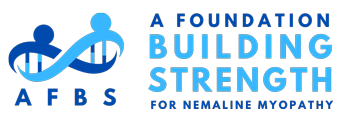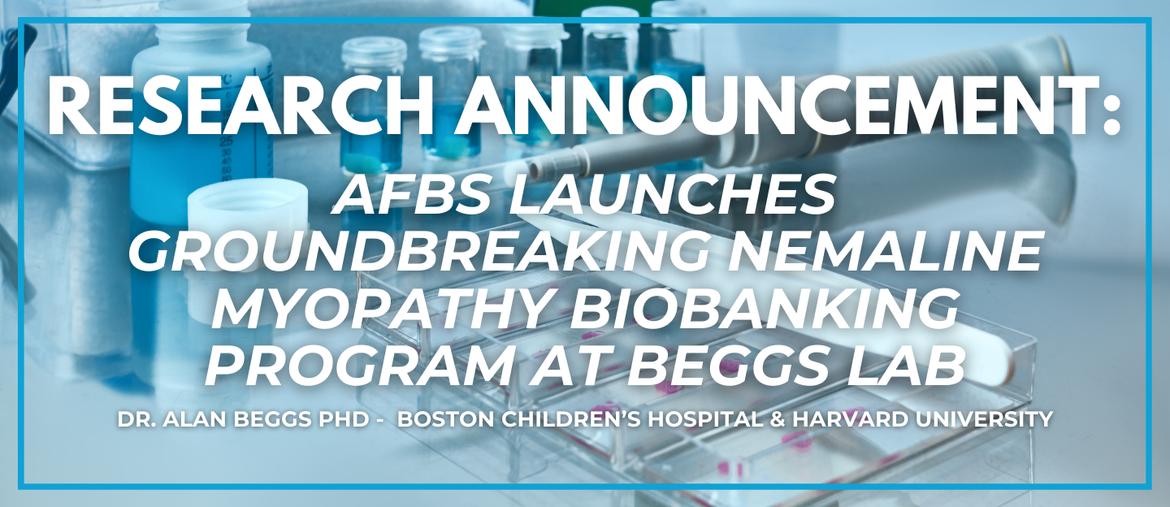A Foundation Building Strength (AFBS) proudly announces a significant expansion of its Nemaline Myopathy (NM) research efforts through the launch of the Beggs Laboratory NM Biobanking Program at Boston Children’s Hospital. This groundbreaking initiative builds upon the existing AFBS-sponsored NM Tissue Repository and aims to revolutionize our understanding of NM, forging a path toward new treatments and therapies.
Understanding Nemaline Myopathy
NM, a rare genetic neuromuscular disorder, causes muscle weakness and decreased muscle tone (hypotonia). The severity of this condition varies widely: while some individuals experience mild symptoms with minimal impact on daily life, others face severe disability, and in some cases, life-threatening complications. Although researchers have made progress in understanding NM’s genetic basis, much remains to be discovered about the underlying mechanisms and potential therapeutic targets.
Expanding the Biobank’s Reach
Under the leadership of renowned genetics and muscle biology expert Dr. Alan Beggs, The Beggs Lab NM Biobanking Program will take over an existing AFBS-sponsored tissue repository previously housed at the Medical College of Wisconsin. Beyond the existing repository content, the Beggs Lab will actively work with AFBS and the NM community to collect clinical information, DNA, and muscle tissue from newly diagnosed individuals, either from existing clinical specimens or future procedures such as surgeries, fetal sampling, autopsies, and muscle biopsies. This comprehensive approach ensures a rich and diverse collection of samples, creating a valuable resource for researchers to study the genetic and molecular underpinnings of this condition.
Empowering Patients and Families
A key aspect of this program is its commitment to patient empowerment. Recognizing the invaluable contribution patients and families can make to medical research, the biobank welcomes tissue donations from individuals with NM of all ages and genetic subtypes.
AFBS and Beggs Lab have made it a priority to ensure participation in the biobank is accessible and free of financial burdens, allowing anyone affected by NM to contribute to the advancement of knowledge and the development of new treatments.
As part of the program, genetic testing will be offered to participants who haven’t yet received a confirmed genetic diagnosis for their NM. This will help researchers understand the genetic landscape of NM.
Expanding Research Horizons
The biobank will serve as a central hub for NM research, housing a wide range of samples from individuals of all ages and genetic subtypes. Tissue specimens will be carefully stored at the Beggs Lab under optimal conditions, ensuring their preservation for future studies.
The biobank will maintain a detailed catalog of samples, including information on age, gender, genetic makeup, muscle type, and collection method. A detailed list of available de-identified specimens will be shared with the broader NM research community through AFBS. Researchers at academic medical centers, universities, and relevant industry entities can request samples free of charge to further their understanding of NM.
In addition, the program will create a contact registry to help identify and recruit participants for future studies, including a planned natural history study sponsored by AFBS. This study will provide valuable insights into the progression of NM and inform the development of new therapies.
A Brighter Future for the NM Community
The Beggs Lab NM Biobanking Program represents a significant step forward in the mission to understand and treat Nemaline Myopathy. Combining existing resources with new initiatives, this program has the potential to transform our understanding of the disease and ultimately improve the lives of individuals and families affected by NM.
By meticulously studying DNA and muscle tissue samples, Dr. Beggs and his team strive to identify new genes associated with NM, establish correlations between genetic changes and clinical outcomes (genotype-phenotype correlations), and uncover novel therapeutic targets.
Moreover, the data generated from this biobanking program not only fuels fundamental research but also informs clinical trial planning and follow-up. By fostering active collaboration among scientists, clinicians, and patient advocacy groups, the program accelerates the translation of research findings into improved clinical care for individuals living with NM.
How You Can Make a Difference
If you or a loved one has NM and are interested in participating in the Beggs Lab NM Biobanking Program, please contact AFBS through this form for more information and a dedicated member of our staff will reach out to assist you. Your contribution could make a lasting impact on the lives of countless individuals affected by this rare and often debilitating condition.
Together, we can build a brighter future for the NM community.


Hi, I am a 60 year old female that has Nemaline-rod Myopathy. I may be interested in contributing to your research and would also like to be on your list on possible treatments for the disease.
The best way to stay informed about the latest research and future opportunities to be involved in research is to complete the AFBS NM Contact Survey: https://www.surveymonkey.com/r/AFBS-Contact-List. We will add you to our e-news and keep you informed on the latest NM progress!